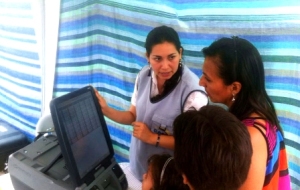
Ecuadorians in Santo Domingo de los Tsáchilas used e-voting during the February 23 elections (Image CNE Ecuador)
On Sunday, February 23rd, Ecuador took a great step towards the modernization of its electoral system. The South American nation went to the polls to renew its provincial authorities (23 prefects, 221 mayors, 1,305 councilmen and 4,079 members of the parish boards).
The provinces of Azuay and Santo Domingo de los Tsáchilas had the opportunity to experience the benefits of e-voting in two legally binding pilots coordinated by the National Electoral Council.
The experience in Santo Domingo de los Tsáchilas has a particular historical significance, since results were announced barely an hour after the polls had closed.
Over 300 thousand voters in Santo Domingo used electoral technology provided by the multinational company Smartmatic, the only one which recorded and tallied votes automatically and with a 100% precision.
For Daniel Sánchez Anchundia, aged 28 and affected by cerebral palsy, the implementation of e-voting in Santo Domingo was a blessing. Thanks to the machine’s user-friendly interface, Daniel could vote by pressing the screen with his right hand, and after a minute, the machine printed a voucher that he picked up and gave his mother so she could deposit it in a ballot box.
According to statements by the National Electoral Council project manager, Alfredo Paredes, “the e-voting we used in Santo Domingo de los Tsáchilas, in addition to being safe, allowed citizens to cast their votes easily. This technology we used has been tested in elections in many other countries, which meant a successful project for us.”
Meanwhile, the system used in Azuay had some setbacks, to the point that in Ponce Enríquez canton e-voting was temporarily halted due to failures in the system and problems with the pictures of candidates belonging to the same list. There were also machine replacements, complaints about delays and an unfamiliarity of the public with the operation of the machines.
On the other hand, Wilfredo Penco, general coordinator for the Union of South American Nations (Unasur) commission of observers, showed his satisfaction with the process and stated that, with the exception of certain incidents, everything took place without significant issues.

